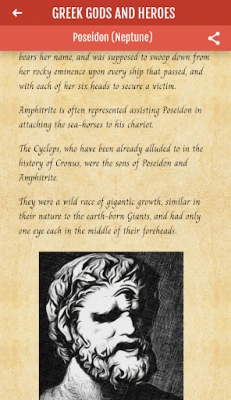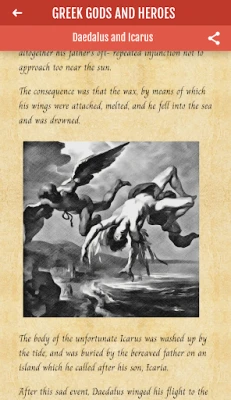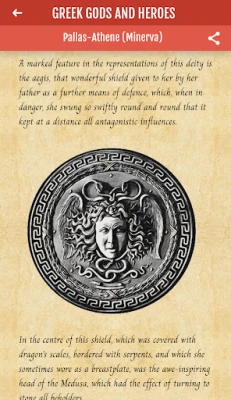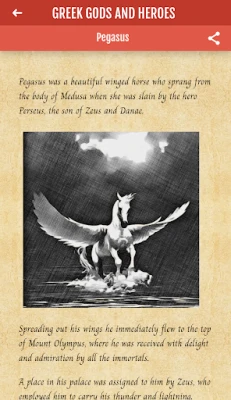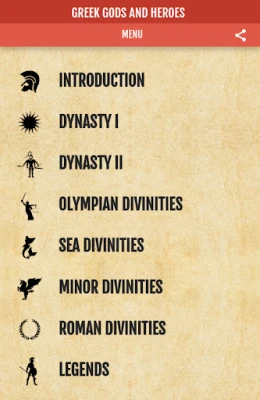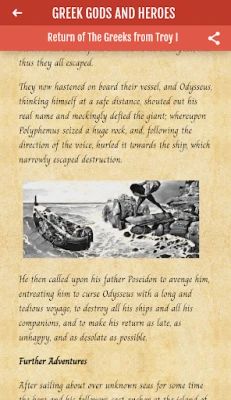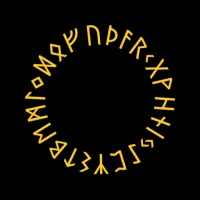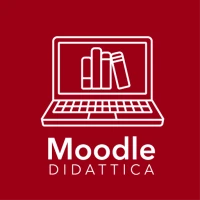
Latest Version
8.1
January 03, 2025
September 13
Education
Android
0
Free
september13.com.Great_Adventures_of_Greek_Gods_and_Heroes
Report a Problem
More About Greek Gods and Heroes
Exploring Mythical Legends: A Journey Through Classical Art and Ancient Stories
Embark on a captivating journey through the rich tapestry of mythical stories, beautifully illustrated and inspired by classical art. This exploration takes readers back to the origins of these legendary tales, delving into the nature of the world as it was understood in ancient times. Discover the pantheon of the Gods of Olympus, the Lesser Gods, and the heroic figures who shaped these timeless narratives.
The Origins of Mythical Stories
Mythical stories have been a cornerstone of human culture, serving as a means to explain the unexplainable and to convey moral lessons. These tales often reflect the values and beliefs of the societies that created them. By examining the origins of these myths, we can gain insight into the ancient world and its understanding of nature, humanity, and the divine.
The Gods of Olympus: Titans of Power
The Gods of Olympus stand as towering figures in Greek mythology, each embodying different aspects of life and the universe. From Zeus, the king of the gods, to Athena, the goddess of wisdom, these deities played crucial roles in the lives of mortals. Their stories are filled with drama, passion, and conflict, illustrating the complexities of human nature and the divine.
Zeus: The Ruler of the Skies
As the chief deity, Zeus wielded immense power over the heavens and the earth. His numerous affairs and offspring created a web of relationships that intertwined the fates of gods and mortals alike. The tales of Zeus not only highlight his authority but also his vulnerabilities, making him a relatable figure despite his divine status.
Athena: The Goddess of Wisdom
Athena, born from the forehead of Zeus, represents intelligence, strategy, and warfare. Her role as a protector of cities and a guide for heroes showcases the importance of wisdom in overcoming challenges. The stories surrounding Athena emphasize the value of knowledge and the strength that comes from it.
The Lesser Gods: Guardians of Nature and Humanity
While the Olympian gods often receive the most attention, the Lesser Gods play vital roles in the mythology as well. These deities, associated with various aspects of nature and human experience, provide a deeper understanding of the world around us.
Dionysus: The God of Wine and Ecstasy
Dionysus, the god of wine, revelry, and fertility, embodies the duality of pleasure and chaos. His festivals celebrated the joys of life but also served as a reminder of the thin line between ecstasy and madness. Through Dionysus, we learn about the importance of balance in our pursuits.
Demeter: The Goddess of Harvest
Demeter, the goddess of agriculture, represents the nurturing aspect of nature. Her relationship with her daughter Persephone highlights the cycles of life and death, as well as the changing seasons. This myth serves as a poignant reminder of the interconnectedness of all living things.
Classical Heroes: Legends of Valor and Sacrifice
The heroes of classical mythology are celebrated for their extraordinary feats and moral dilemmas. These figures, such as Hercules, Achilles, and Odysseus, embody the ideals of bravery, honor, and sacrifice. Their stories resonate with readers, offering timeless lessons on the human condition.
Hercules: The Heroic Journey
Hercules, known for his incredible strength and courage, undertook twelve labors that tested his resolve and character. Each labor not only showcased his physical prowess but also his growth as a hero. The trials of Hercules remind us that true strength lies not just in physical ability but in perseverance and integrity.
Odysseus: The Master of Cunning
Odysseus, the clever hero of the Trojan War, is renowned for his intelligence and resourcefulness. His epic journey home, filled with challenges and temptations, illustrates the importance of wit and adaptability. The tale of Odysseus serves as a metaphor for the journey of life, where the path is often fraught with obstacles that require both courage and cleverness to overcome.
Family Relationships in Mythology
The intricate family dynamics among the gods and heroes add depth to these ancient stories. Relationships often drive the narratives, revealing themes of love, betrayal, and loyalty. Understanding these connections enhances our appreciation of the myths and their relevance to human experiences.
The Tragic Love of Orpheus and Eurydice
The story of Orpheus and Eurydice is a poignant tale of love and loss. Orpheus, a gifted musician, descends into the underworld to retrieve his beloved Eurydice, only to lose her again due to his inability to trust. This myth underscores the fragility of love and the consequences of doubt, resonating with anyone who has experienced heartache.
Conclusion: The Enduring Legacy of Mythology
The journey through mythical stories, enriched by classical art, offers a profound understanding of the human experience. These legends, filled with gods, heroes, and intricate relationships, continue to inspire and teach us valuable lessons. As we explore these timeless tales, we connect with the past and reflect on the enduring nature of our own stories.
In a world that often feels disconnected, the myths of ancient civilizations remind us of our shared humanity and the universal themes that bind us together. Whether through the grandeur of Olympus or the trials of heroes, these narratives invite us to reflect on our own journeys and the legacies we create.
Rate the App
User Reviews
Popular Apps



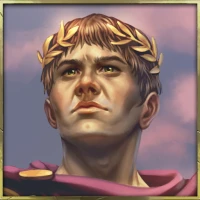






Editor's Choice











